Intercultural Management in Business: Literature Review Analysis
VerifiedAdded on 2023/01/18
|7
|1697
|47
Literature Review
AI Summary
This literature review examines the multifaceted field of intercultural management within the context of international business. It explores the core concepts, including the importance of understanding cultural variability and its impact on various aspects of business operations. The review delves into the influence of individualism and collectivism on employee behavior and motivation, highlighting how these cultural dimensions shape working styles and communication preferences. Furthermore, it analyzes the role of effective communication strategies, persuasion techniques, and the impact of culture on employee motivation within international settings. The review also discusses the importance of establishing strong employee relations and creating a diverse and inclusive work environment to achieve organizational goals in the global market. The study concludes by emphasizing the importance of intercultural management in fostering successful international business practices.
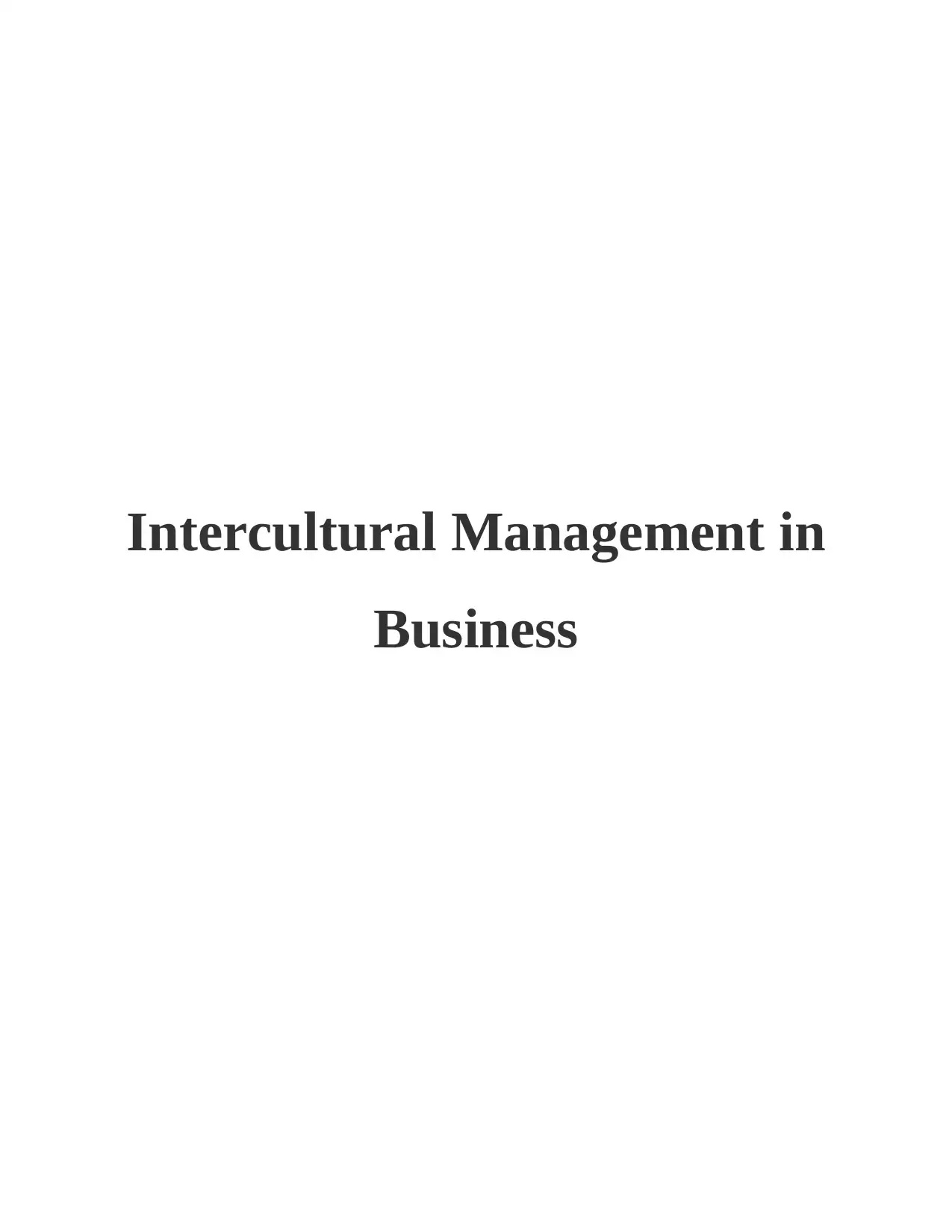
Intercultural Management in
Business
Business
Paraphrase This Document
Need a fresh take? Get an instant paraphrase of this document with our AI Paraphraser
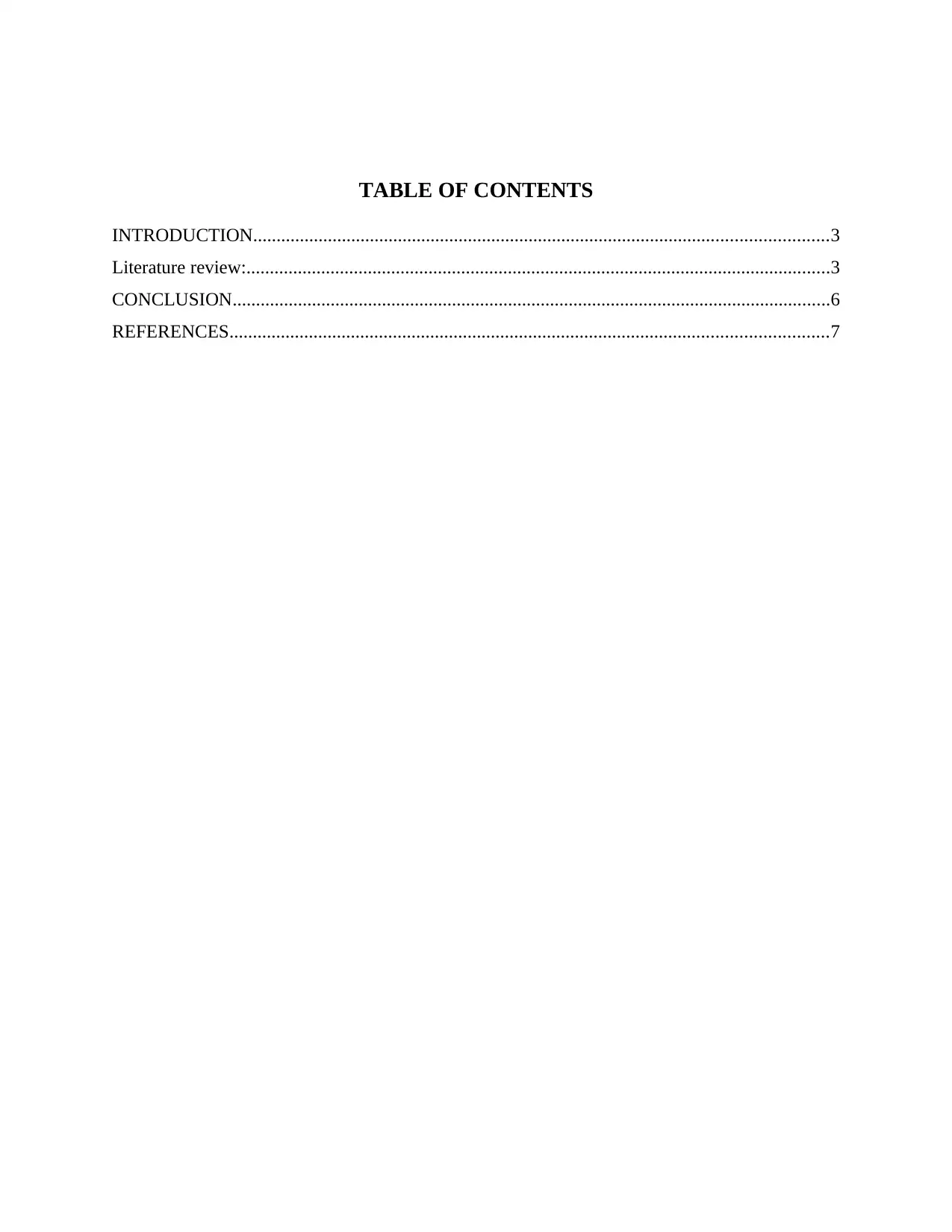
TABLE OF CONTENTS
INTRODUCTION...........................................................................................................................3
Literature review:.............................................................................................................................3
CONCLUSION................................................................................................................................6
REFERENCES................................................................................................................................7
INTRODUCTION...........................................................................................................................3
Literature review:.............................................................................................................................3
CONCLUSION................................................................................................................................6
REFERENCES................................................................................................................................7
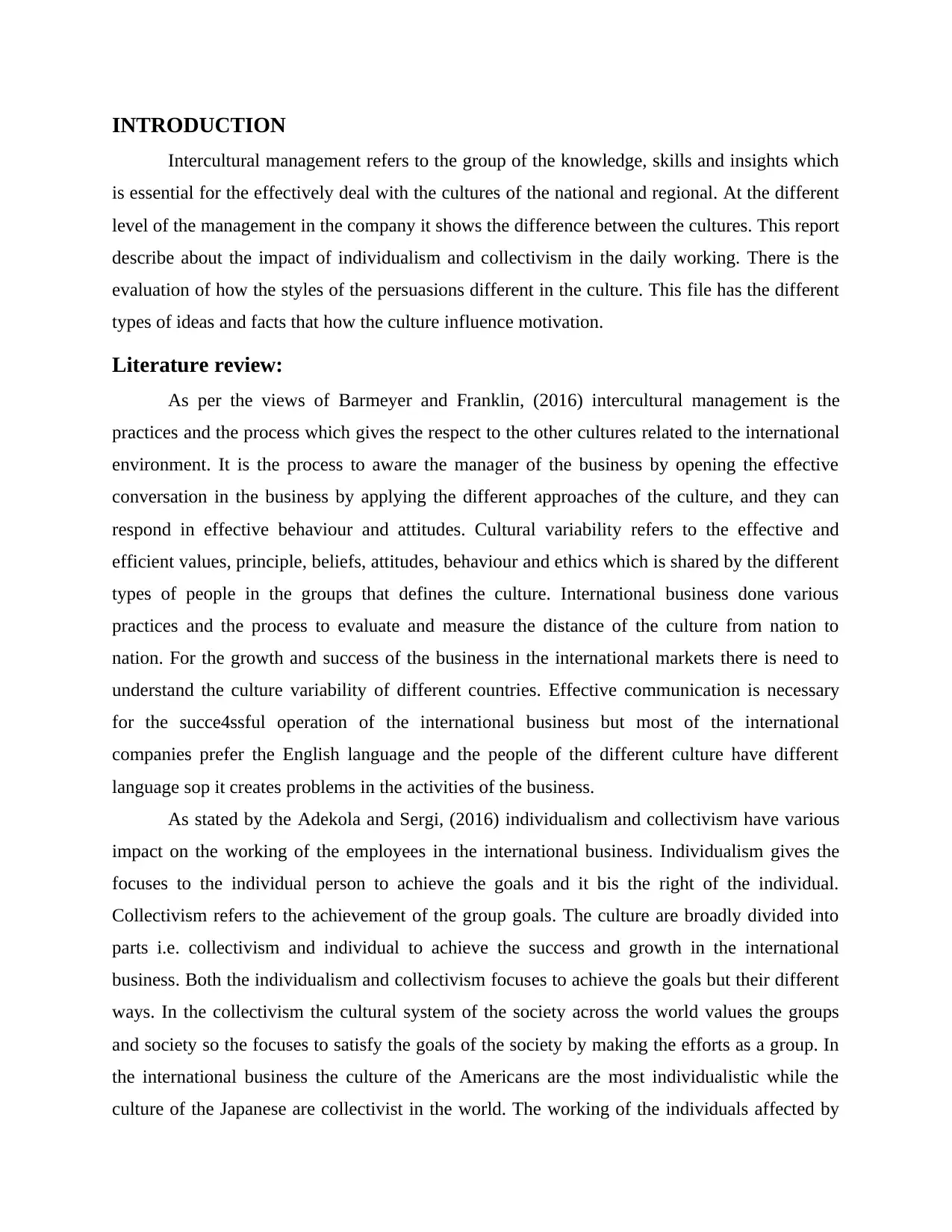
INTRODUCTION
Intercultural management refers to the group of the knowledge, skills and insights which
is essential for the effectively deal with the cultures of the national and regional. At the different
level of the management in the company it shows the difference between the cultures. This report
describe about the impact of individualism and collectivism in the daily working. There is the
evaluation of how the styles of the persuasions different in the culture. This file has the different
types of ideas and facts that how the culture influence motivation.
Literature review:
As per the views of Barmeyer and Franklin, (2016) intercultural management is the
practices and the process which gives the respect to the other cultures related to the international
environment. It is the process to aware the manager of the business by opening the effective
conversation in the business by applying the different approaches of the culture, and they can
respond in effective behaviour and attitudes. Cultural variability refers to the effective and
efficient values, principle, beliefs, attitudes, behaviour and ethics which is shared by the different
types of people in the groups that defines the culture. International business done various
practices and the process to evaluate and measure the distance of the culture from nation to
nation. For the growth and success of the business in the international markets there is need to
understand the culture variability of different countries. Effective communication is necessary
for the succe4ssful operation of the international business but most of the international
companies prefer the English language and the people of the different culture have different
language sop it creates problems in the activities of the business.
As stated by the Adekola and Sergi, (2016) individualism and collectivism have various
impact on the working of the employees in the international business. Individualism gives the
focuses to the individual person to achieve the goals and it bis the right of the individual.
Collectivism refers to the achievement of the group goals. The culture are broadly divided into
parts i.e. collectivism and individual to achieve the success and growth in the international
business. Both the individualism and collectivism focuses to achieve the goals but their different
ways. In the collectivism the cultural system of the society across the world values the groups
and society so the focuses to satisfy the goals of the society by making the efforts as a group. In
the international business the culture of the Americans are the most individualistic while the
culture of the Japanese are collectivist in the world. The working of the individuals affected by
Intercultural management refers to the group of the knowledge, skills and insights which
is essential for the effectively deal with the cultures of the national and regional. At the different
level of the management in the company it shows the difference between the cultures. This report
describe about the impact of individualism and collectivism in the daily working. There is the
evaluation of how the styles of the persuasions different in the culture. This file has the different
types of ideas and facts that how the culture influence motivation.
Literature review:
As per the views of Barmeyer and Franklin, (2016) intercultural management is the
practices and the process which gives the respect to the other cultures related to the international
environment. It is the process to aware the manager of the business by opening the effective
conversation in the business by applying the different approaches of the culture, and they can
respond in effective behaviour and attitudes. Cultural variability refers to the effective and
efficient values, principle, beliefs, attitudes, behaviour and ethics which is shared by the different
types of people in the groups that defines the culture. International business done various
practices and the process to evaluate and measure the distance of the culture from nation to
nation. For the growth and success of the business in the international markets there is need to
understand the culture variability of different countries. Effective communication is necessary
for the succe4ssful operation of the international business but most of the international
companies prefer the English language and the people of the different culture have different
language sop it creates problems in the activities of the business.
As stated by the Adekola and Sergi, (2016) individualism and collectivism have various
impact on the working of the employees in the international business. Individualism gives the
focuses to the individual person to achieve the goals and it bis the right of the individual.
Collectivism refers to the achievement of the group goals. The culture are broadly divided into
parts i.e. collectivism and individual to achieve the success and growth in the international
business. Both the individualism and collectivism focuses to achieve the goals but their different
ways. In the collectivism the cultural system of the society across the world values the groups
and society so the focuses to satisfy the goals of the society by making the efforts as a group. In
the international business the culture of the Americans are the most individualistic while the
culture of the Japanese are collectivist in the world. The working of the individuals affected by
⊘ This is a preview!⊘
Do you want full access?
Subscribe today to unlock all pages.

Trusted by 1+ million students worldwide
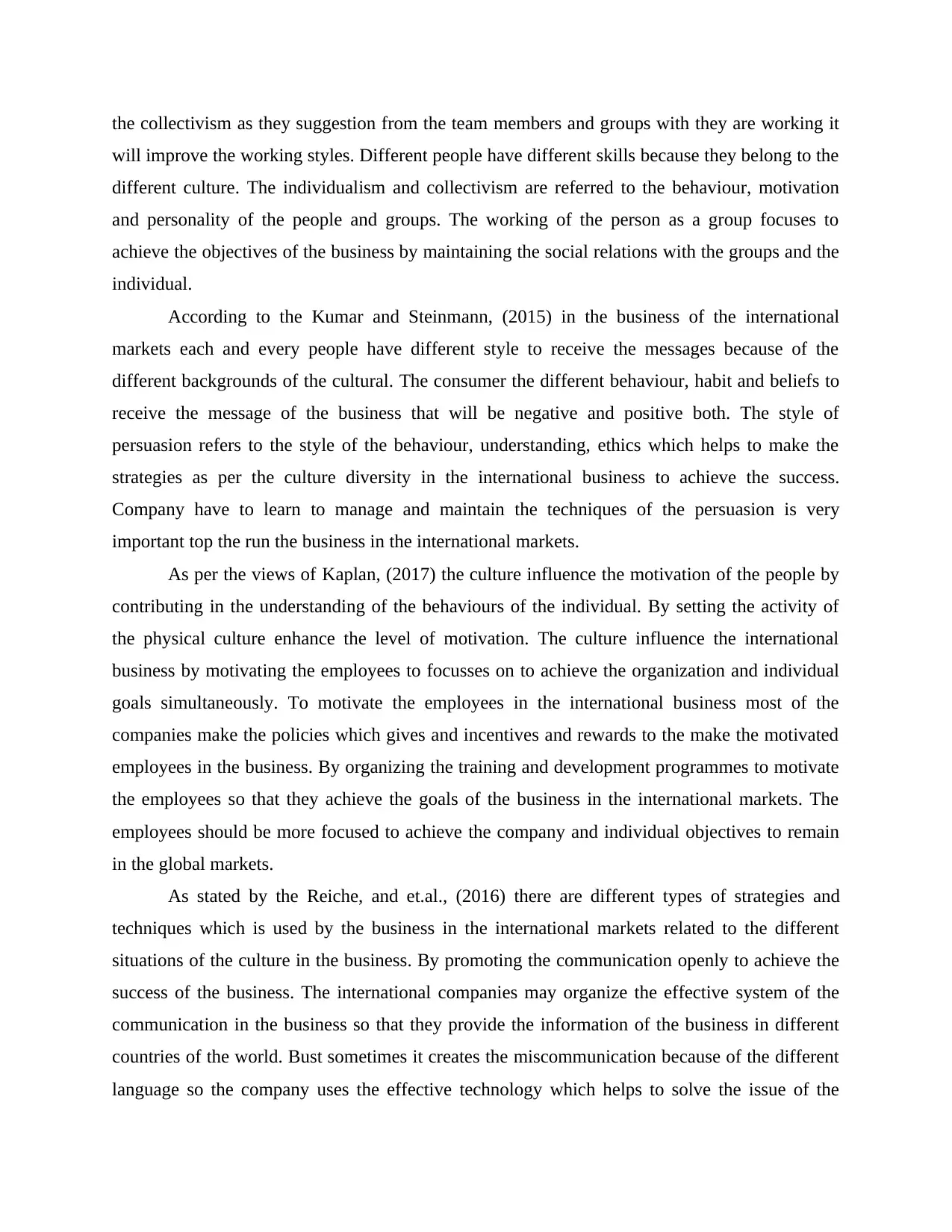
the collectivism as they suggestion from the team members and groups with they are working it
will improve the working styles. Different people have different skills because they belong to the
different culture. The individualism and collectivism are referred to the behaviour, motivation
and personality of the people and groups. The working of the person as a group focuses to
achieve the objectives of the business by maintaining the social relations with the groups and the
individual.
According to the Kumar and Steinmann, (2015) in the business of the international
markets each and every people have different style to receive the messages because of the
different backgrounds of the cultural. The consumer the different behaviour, habit and beliefs to
receive the message of the business that will be negative and positive both. The style of
persuasion refers to the style of the behaviour, understanding, ethics which helps to make the
strategies as per the culture diversity in the international business to achieve the success.
Company have to learn to manage and maintain the techniques of the persuasion is very
important top the run the business in the international markets.
As per the views of Kaplan, (2017) the culture influence the motivation of the people by
contributing in the understanding of the behaviours of the individual. By setting the activity of
the physical culture enhance the level of motivation. The culture influence the international
business by motivating the employees to focusses on to achieve the organization and individual
goals simultaneously. To motivate the employees in the international business most of the
companies make the policies which gives and incentives and rewards to the make the motivated
employees in the business. By organizing the training and development programmes to motivate
the employees so that they achieve the goals of the business in the international markets. The
employees should be more focused to achieve the company and individual objectives to remain
in the global markets.
As stated by the Reiche, and et.al., (2016) there are different types of strategies and
techniques which is used by the business in the international markets related to the different
situations of the culture in the business. By promoting the communication openly to achieve the
success of the business. The international companies may organize the effective system of the
communication in the business so that they provide the information of the business in different
countries of the world. Bust sometimes it creates the miscommunication because of the different
language so the company uses the effective technology which helps to solve the issue of the
will improve the working styles. Different people have different skills because they belong to the
different culture. The individualism and collectivism are referred to the behaviour, motivation
and personality of the people and groups. The working of the person as a group focuses to
achieve the objectives of the business by maintaining the social relations with the groups and the
individual.
According to the Kumar and Steinmann, (2015) in the business of the international
markets each and every people have different style to receive the messages because of the
different backgrounds of the cultural. The consumer the different behaviour, habit and beliefs to
receive the message of the business that will be negative and positive both. The style of
persuasion refers to the style of the behaviour, understanding, ethics which helps to make the
strategies as per the culture diversity in the international business to achieve the success.
Company have to learn to manage and maintain the techniques of the persuasion is very
important top the run the business in the international markets.
As per the views of Kaplan, (2017) the culture influence the motivation of the people by
contributing in the understanding of the behaviours of the individual. By setting the activity of
the physical culture enhance the level of motivation. The culture influence the international
business by motivating the employees to focusses on to achieve the organization and individual
goals simultaneously. To motivate the employees in the international business most of the
companies make the policies which gives and incentives and rewards to the make the motivated
employees in the business. By organizing the training and development programmes to motivate
the employees so that they achieve the goals of the business in the international markets. The
employees should be more focused to achieve the company and individual objectives to remain
in the global markets.
As stated by the Reiche, and et.al., (2016) there are different types of strategies and
techniques which is used by the business in the international markets related to the different
situations of the culture in the business. By promoting the communication openly to achieve the
success of the business. The international companies may organize the effective system of the
communication in the business so that they provide the information of the business in different
countries of the world. Bust sometimes it creates the miscommunication because of the different
language so the company uses the effective technology which helps to solve the issue of the
Paraphrase This Document
Need a fresh take? Get an instant paraphrase of this document with our AI Paraphraser
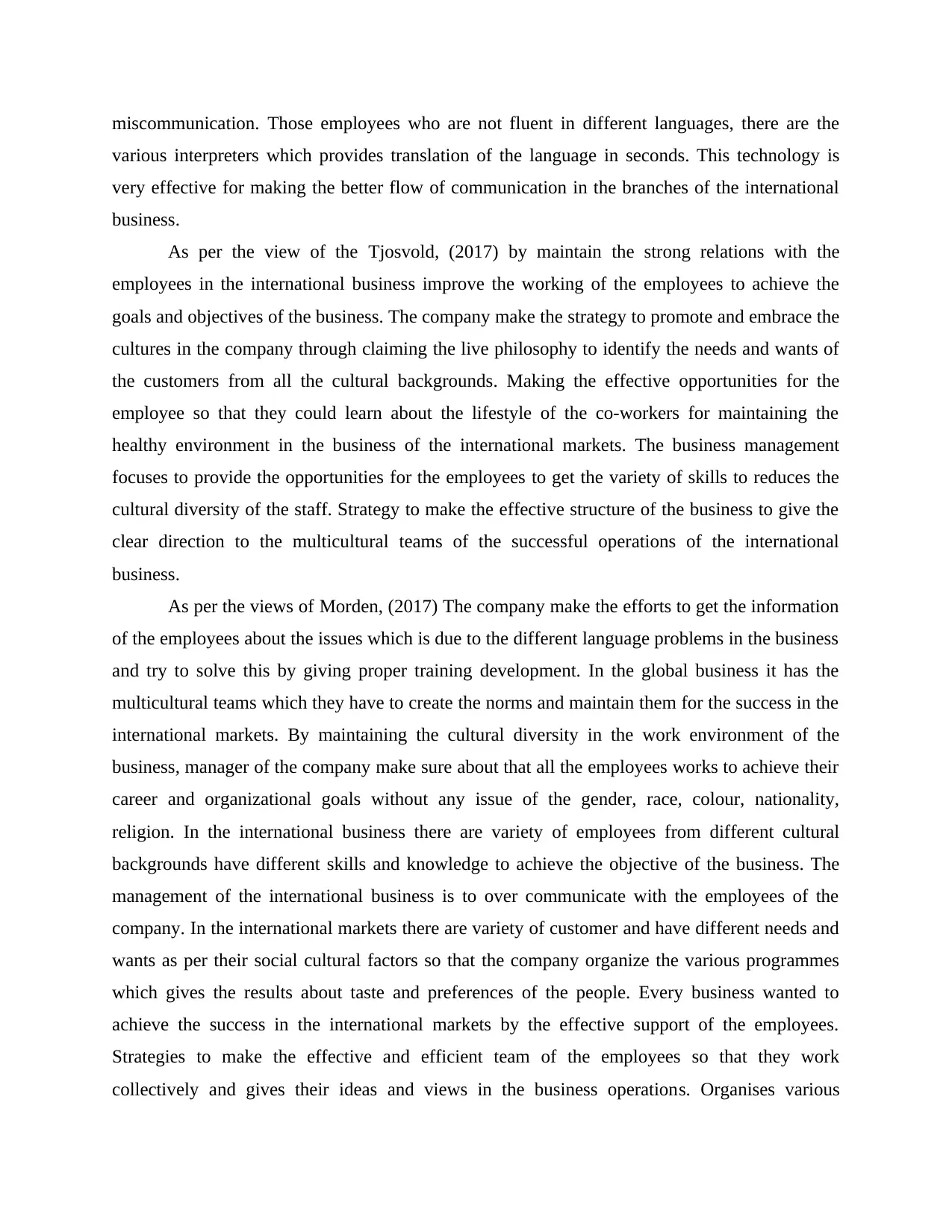
miscommunication. Those employees who are not fluent in different languages, there are the
various interpreters which provides translation of the language in seconds. This technology is
very effective for making the better flow of communication in the branches of the international
business.
As per the view of the Tjosvold, (2017) by maintain the strong relations with the
employees in the international business improve the working of the employees to achieve the
goals and objectives of the business. The company make the strategy to promote and embrace the
cultures in the company through claiming the live philosophy to identify the needs and wants of
the customers from all the cultural backgrounds. Making the effective opportunities for the
employee so that they could learn about the lifestyle of the co-workers for maintaining the
healthy environment in the business of the international markets. The business management
focuses to provide the opportunities for the employees to get the variety of skills to reduces the
cultural diversity of the staff. Strategy to make the effective structure of the business to give the
clear direction to the multicultural teams of the successful operations of the international
business.
As per the views of Morden, (2017) The company make the efforts to get the information
of the employees about the issues which is due to the different language problems in the business
and try to solve this by giving proper training development. In the global business it has the
multicultural teams which they have to create the norms and maintain them for the success in the
international markets. By maintaining the cultural diversity in the work environment of the
business, manager of the company make sure about that all the employees works to achieve their
career and organizational goals without any issue of the gender, race, colour, nationality,
religion. In the international business there are variety of employees from different cultural
backgrounds have different skills and knowledge to achieve the objective of the business. The
management of the international business is to over communicate with the employees of the
company. In the international markets there are variety of customer and have different needs and
wants as per their social cultural factors so that the company organize the various programmes
which gives the results about taste and preferences of the people. Every business wanted to
achieve the success in the international markets by the effective support of the employees.
Strategies to make the effective and efficient team of the employees so that they work
collectively and gives their ideas and views in the business operations. Organises various
various interpreters which provides translation of the language in seconds. This technology is
very effective for making the better flow of communication in the branches of the international
business.
As per the view of the Tjosvold, (2017) by maintain the strong relations with the
employees in the international business improve the working of the employees to achieve the
goals and objectives of the business. The company make the strategy to promote and embrace the
cultures in the company through claiming the live philosophy to identify the needs and wants of
the customers from all the cultural backgrounds. Making the effective opportunities for the
employee so that they could learn about the lifestyle of the co-workers for maintaining the
healthy environment in the business of the international markets. The business management
focuses to provide the opportunities for the employees to get the variety of skills to reduces the
cultural diversity of the staff. Strategy to make the effective structure of the business to give the
clear direction to the multicultural teams of the successful operations of the international
business.
As per the views of Morden, (2017) The company make the efforts to get the information
of the employees about the issues which is due to the different language problems in the business
and try to solve this by giving proper training development. In the global business it has the
multicultural teams which they have to create the norms and maintain them for the success in the
international markets. By maintaining the cultural diversity in the work environment of the
business, manager of the company make sure about that all the employees works to achieve their
career and organizational goals without any issue of the gender, race, colour, nationality,
religion. In the international business there are variety of employees from different cultural
backgrounds have different skills and knowledge to achieve the objective of the business. The
management of the international business is to over communicate with the employees of the
company. In the international markets there are variety of customer and have different needs and
wants as per their social cultural factors so that the company organize the various programmes
which gives the results about taste and preferences of the people. Every business wanted to
achieve the success in the international markets by the effective support of the employees.
Strategies to make the effective and efficient team of the employees so that they work
collectively and gives their ideas and views in the business operations. Organises various
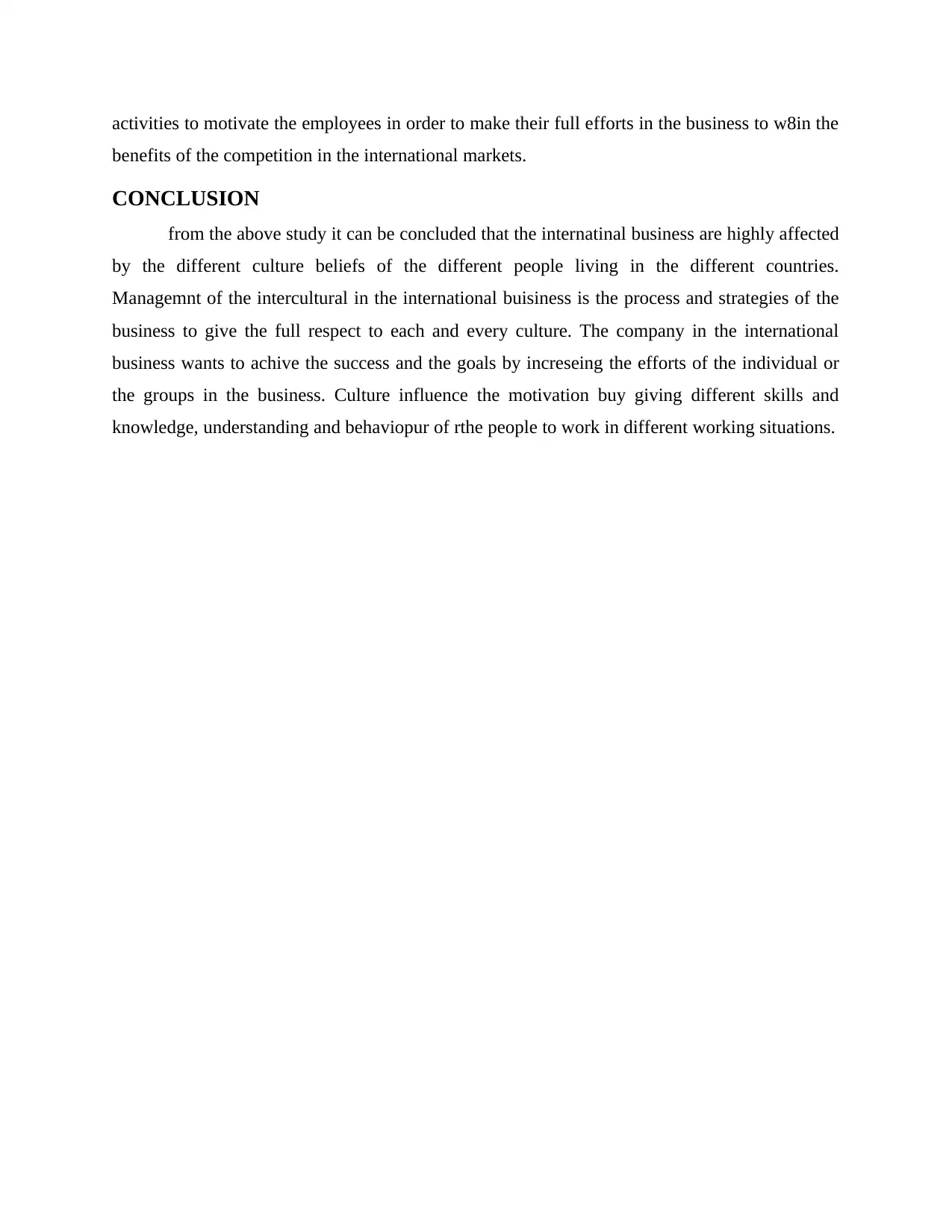
activities to motivate the employees in order to make their full efforts in the business to w8in the
benefits of the competition in the international markets.
CONCLUSION
from the above study it can be concluded that the internatinal business are highly affected
by the different culture beliefs of the different people living in the different countries.
Managemnt of the intercultural in the international buisiness is the process and strategies of the
business to give the full respect to each and every culture. The company in the international
business wants to achive the success and the goals by increseing the efforts of the individual or
the groups in the business. Culture influence the motivation buy giving different skills and
knowledge, understanding and behaviopur of rthe people to work in different working situations.
benefits of the competition in the international markets.
CONCLUSION
from the above study it can be concluded that the internatinal business are highly affected
by the different culture beliefs of the different people living in the different countries.
Managemnt of the intercultural in the international buisiness is the process and strategies of the
business to give the full respect to each and every culture. The company in the international
business wants to achive the success and the goals by increseing the efforts of the individual or
the groups in the business. Culture influence the motivation buy giving different skills and
knowledge, understanding and behaviopur of rthe people to work in different working situations.
⊘ This is a preview!⊘
Do you want full access?
Subscribe today to unlock all pages.

Trusted by 1+ million students worldwide
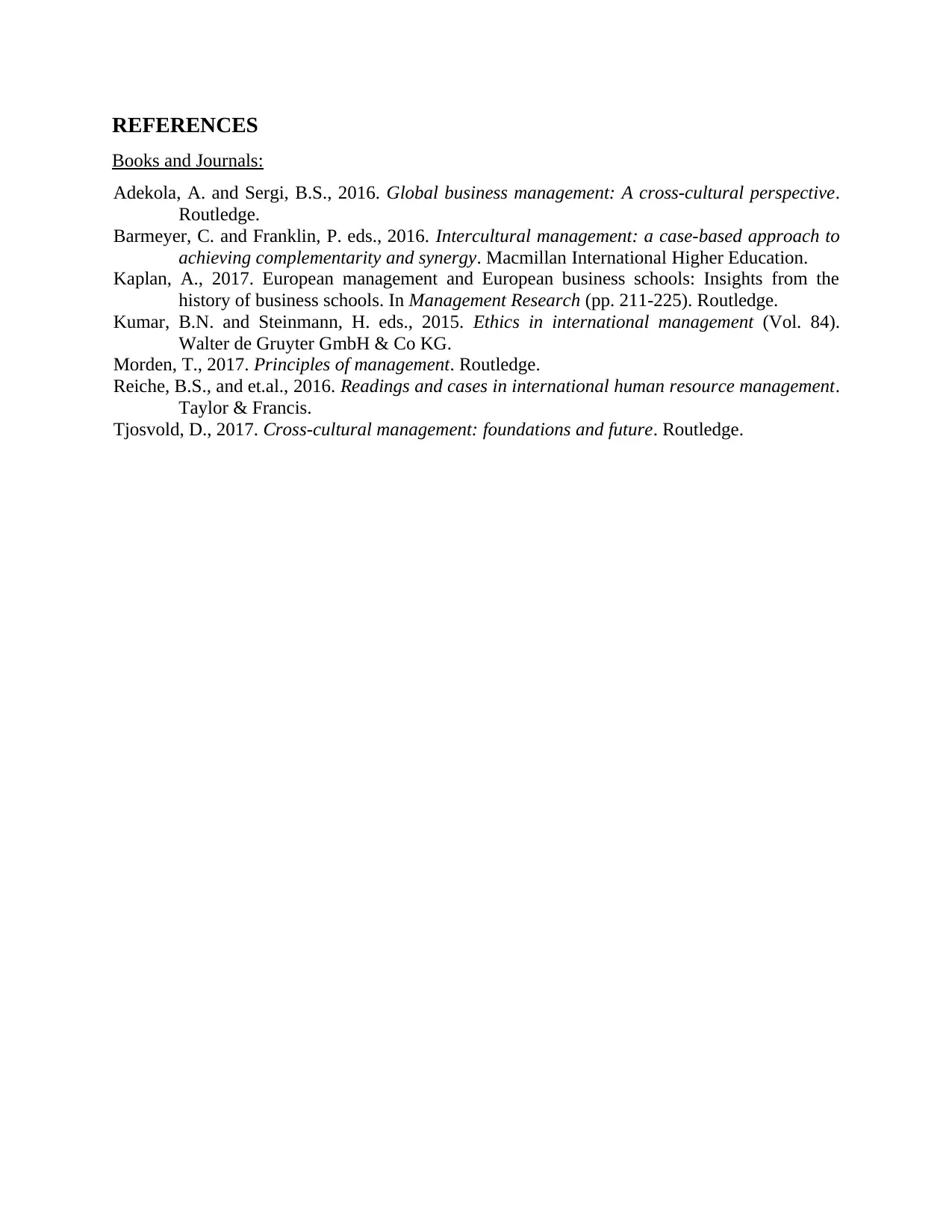
REFERENCES
Books and Journals:
Adekola, A. and Sergi, B.S., 2016. Global business management: A cross-cultural perspective.
Routledge.
Barmeyer, C. and Franklin, P. eds., 2016. Intercultural management: a case-based approach to
achieving complementarity and synergy. Macmillan International Higher Education.
Kaplan, A., 2017. European management and European business schools: Insights from the
history of business schools. In Management Research (pp. 211-225). Routledge.
Kumar, B.N. and Steinmann, H. eds., 2015. Ethics in international management (Vol. 84).
Walter de Gruyter GmbH & Co KG.
Morden, T., 2017. Principles of management. Routledge.
Reiche, B.S., and et.al., 2016. Readings and cases in international human resource management.
Taylor & Francis.
Tjosvold, D., 2017. Cross-cultural management: foundations and future. Routledge.
Books and Journals:
Adekola, A. and Sergi, B.S., 2016. Global business management: A cross-cultural perspective.
Routledge.
Barmeyer, C. and Franklin, P. eds., 2016. Intercultural management: a case-based approach to
achieving complementarity and synergy. Macmillan International Higher Education.
Kaplan, A., 2017. European management and European business schools: Insights from the
history of business schools. In Management Research (pp. 211-225). Routledge.
Kumar, B.N. and Steinmann, H. eds., 2015. Ethics in international management (Vol. 84).
Walter de Gruyter GmbH & Co KG.
Morden, T., 2017. Principles of management. Routledge.
Reiche, B.S., and et.al., 2016. Readings and cases in international human resource management.
Taylor & Francis.
Tjosvold, D., 2017. Cross-cultural management: foundations and future. Routledge.
1 out of 7
Related Documents
Your All-in-One AI-Powered Toolkit for Academic Success.
+13062052269
info@desklib.com
Available 24*7 on WhatsApp / Email
![[object Object]](/_next/static/media/star-bottom.7253800d.svg)
Unlock your academic potential
Copyright © 2020–2025 A2Z Services. All Rights Reserved. Developed and managed by ZUCOL.





